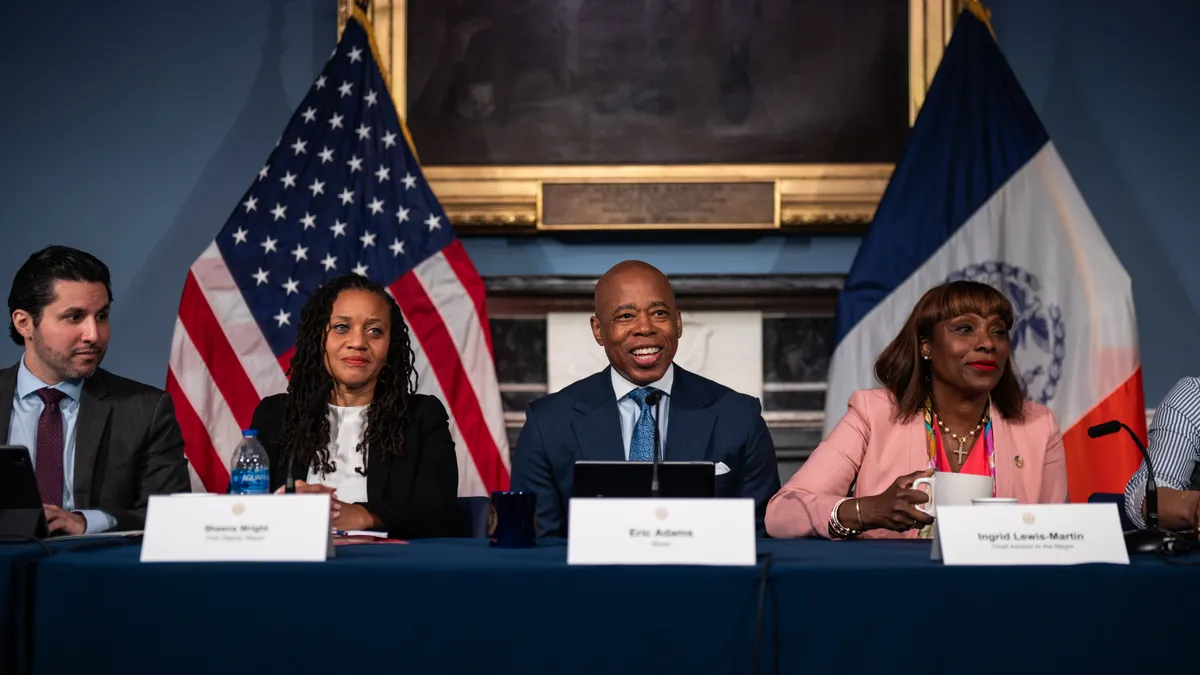Dive Brief:
- The New York City Council approved on June 6, with modifications, the New York City Department of City Planning’s Zoning for Economic Opportunity initiative.
- The new zoning, which applies citywide, is the second of Mayor Eric Adams’ three City of Yes initiatives and marks the first update to commercial zoning regulations since 1961. The proposed set of changes expands where businesses can be located in the city, more than doubles the space for small-scale clean manufacturing, and enables adaptive reuse projects involving existing buildings, the mayor’s office said in a June 6 news release.
- “We have taken another historic step to bring our city’s zoning code into the 21st century,” Adams said in a statement. “Our proposal will replace outdated restrictions on businesses with new rules that support sustainable job growth, help businesses open and expand, and fill vacant storefronts.”
Dive Insight:
The New York City Council’s June 6 vote follows its approval of the City of Yes for Carbon Neutrality initiative in December. The changes put forward as part of this initiative included the removal of zoning impediments to rooftop solar, solar parking canopies, onshore wind and energy storage systems, with a goal of bringing the city “cleaner air, lower energy costs, smarter waste management and better access to [electric vehicle] technologies, Adams said at the time.
The new set of changes in the DCP’s Zoning for Economic Opportunity’s proposal seeks to drive New York CIty’s economic recovery through “commonsense policy changes” that would “help businesses find space and grow, support entrepreneurs and freelancers, boost growing industries, and enable more vibrant streetscapes and commercial corridors,” per the release from the mayor’s office.
These changes include expanding the number of businesses allowed to open in ground- and upper-floor spaces; modernizing how zoning regulates laboratories so that life sciences research can operate in offices near universities and hospitals; and fixing decades-old rules that have banned businesses from setting up in commercial facilities sitting empty for more than two years in residential areas.
The proposed Zoning for Economic Opportunity rules also place an emphasis on expanding manufacturing in the city, more than doubling the space available for clean manufacturing by allowing small businesses — such as microbreweries, apparel makers and ceramic shops — to open and expand in commercial corridors across all five boroughs.
A related policy change involves creating new zoning tools that the city says will allow for more than 17,000 businesses in industrial areas that are currently prevented from adding space to grow their businesses.
“Our efforts will preserve manufacturing districts and enhance the industrial sector, which provides good-paying jobs and can prepare our city for a clean energy future,” New York City Council Speaker Adrienne Adams said in a statement.
Additionally, the zoning changes aim to help local small businesses by expanding local delivery capacity and to modernize loading dock rules that can facilitate the conversion of commercial buildings to other uses, according to the release.
The new text also reorganizes and updates use classifications to be consistent with the North American Industry Classification System, or NAICS, and establishes new streetscape controls to improve pedestrian experience and ensure commercial uses “contribute to surrounding context,” New York City-based law firm Cozen O’Connor said in a release.
The city council will vote on Adams’ third City of Yes initiative, “City of Yes for Housing Opportunity,” by year-end, per the release. Adams said that initiative will further promote adaptive reuse as part of a plan to build 500,000 new homes in New York City by 2032.















